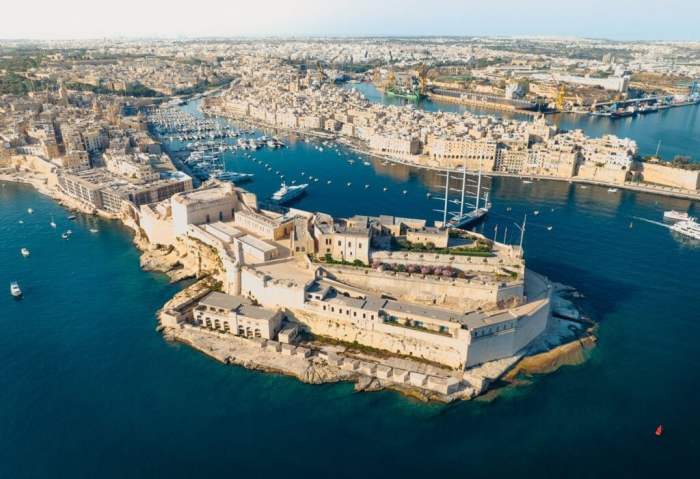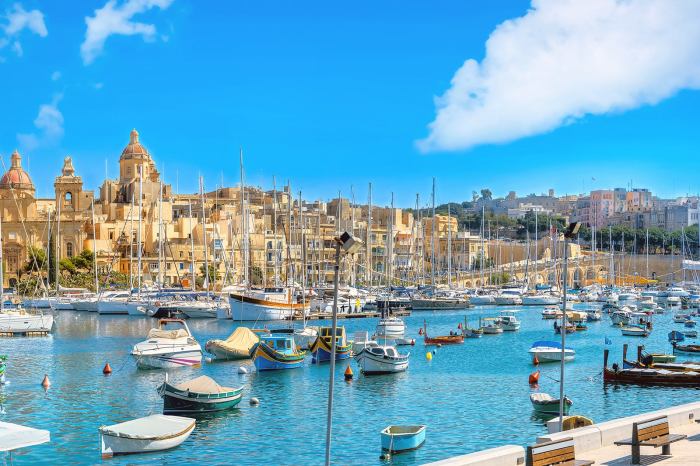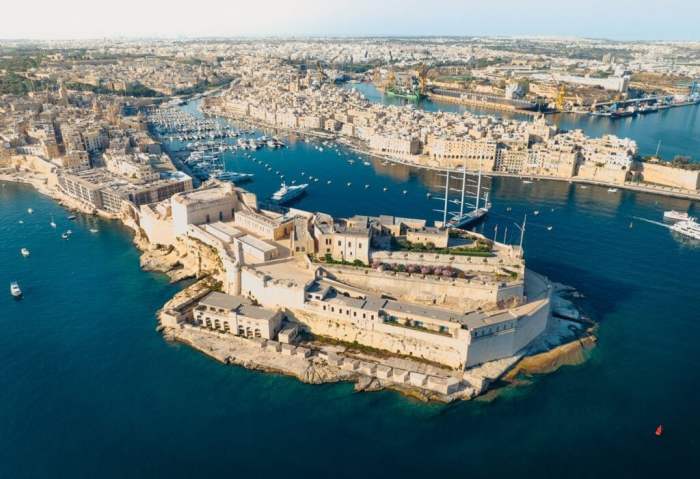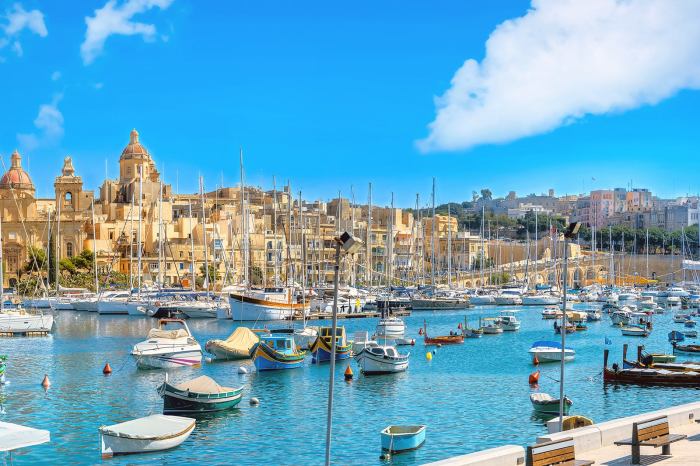Malta budget friendly expat retiree destination offers a compelling lifestyle for those seeking a lower cost of living compared to other popular expat retirement spots. The island nation’s charm, rich culture, and beautiful climate attract retirees seeking a vibrant yet affordable retirement experience. This comprehensive guide explores the key factors, from housing options to healthcare, making Malta an attractive destination for budget-conscious retirees.
Malta boasts a Mediterranean ambiance, blending ancient history with modern amenities. Its affordability, particularly in housing and daily expenses, is a significant draw for retirees looking to stretch their retirement funds. The island’s welcoming atmosphere and active social scene also contribute to the allure of a retirement in Malta.
Introduction to Malta as a Budget-Friendly Destination
Malta, a captivating archipelago in the Mediterranean Sea, offers a surprising appeal to budget-conscious expat retirees. Beyond the iconic historical sites and stunning beaches, Malta presents a unique blend of affordability, vibrant culture, and a high quality of life, making it a compelling alternative to more expensive retirement destinations. The lower cost of living, coupled with a strong local economy, creates a welcoming environment for retirees seeking a fulfilling and financially manageable lifestyle.Malta’s affordability stems from a number of factors.
The local currency, the Euro, often results in lower prices for everyday essentials, housing, and transportation compared to some other popular retirement hotspots in Europe. Furthermore, Malta’s relatively lower cost of living is supported by a robust local economy and a diverse range of services tailored to meet the needs of retirees. The islands’ attractive climate, warm and sunny for most of the year, adds to the overall appeal.
Affordability Factors
Malta’s relatively lower cost of living compared to other popular expat retirement destinations is often attributed to factors like a strong local economy, efficient service sectors, and a diverse range of affordable housing options. Malta’s robust economy provides ample employment opportunities for those who wish to remain active in the workforce, thereby potentially supplementing their retirement income. This economic stability and diversification also help keep prices for essential goods and services lower than in other, potentially more expensive, European locations.
Lifestyle and Culture
Malta’s culture is a rich tapestry woven from its history as a crossroads of civilizations. From the ancient temples to the charming villages, the island nation is brimming with history and heritage. This historical richness is interwoven with a contemporary culture that is welcoming and vibrant. The Maltese people are known for their hospitality and warm embrace of visitors, fostering a friendly and inclusive atmosphere for expats.
The islands offer a plethora of cultural experiences, from traditional Maltese music and dance performances to the exploration of historical sites and museums. This cultural diversity, combined with the ease of accessing local markets and events, contributes to a rich and rewarding lifestyle.
Budget-Friendly Overview
| Location | Cost of Living | Activities | Climate |
|---|---|---|---|
| Malta (various towns and villages) | Generally lower than many Western European destinations. Housing options range from affordable apartments to more luxurious villas. | Numerous historical sites, beaches, vibrant nightlife, local markets, cultural events, and outdoor activities. | Mediterranean; warm, sunny summers and mild winters. Rainfall is typically moderate. |
Housing Options for Budget-Conscious Retirees
Finding affordable housing in Malta is achievable for retirees on a budget. While the island nation is popular for its beautiful scenery and rich culture, housing costs can vary significantly. Understanding the different options available, from rentals to property purchases, is key to making an informed decision. Careful consideration of neighborhood amenities and costs will ensure a comfortable and budget-friendly retirement.Malta offers a range of housing options, catering to various budgets and preferences.
The key is to research and compare options to find the best fit for your individual needs and financial situation. Different neighborhoods offer varying levels of proximity to amenities and attractions.
Rental Options
Rental apartments and villas are a viable and flexible option for retirees seeking temporary accommodation or those hesitant to commit to a long-term purchase. This allows for adjustments to your lifestyle or location based on your changing needs. Rental agreements typically have specific lease terms and conditions, including security deposits and rental periods.
- Short-term rentals are available for temporary stays, offering flexibility for exploring the island.
- Long-term rentals are more suitable for retirees looking for a longer commitment, with often lower monthly costs than purchasing.
- Consider the rental terms and conditions, including deposit amounts and payment schedules.
- Negotiate rental rates and inquire about included amenities (utilities, parking) to reduce overall costs.
Property Purchase Considerations
Buying property in Malta can offer greater long-term cost savings and more ownership control. However, it requires a larger initial investment and ongoing maintenance costs.
- Evaluate your budget and financial stability to determine the affordability of a property purchase.
- Consider the potential appreciation of property values over time, though this is not guaranteed and depends on market conditions.
- Factor in potential maintenance costs, including repairs, renovations, and property taxes.
- Look for properties in less central areas, where prices may be more affordable and still allow for proximity to amenities.
Potential Drawbacks
Both rental and purchase options have potential drawbacks. For rentals, the lack of long-term security and the potential for rent increases can be a concern. Purchasing a property necessitates substantial upfront investment and ongoing maintenance, impacting budget flexibility.
Neighborhoods and Amenities
Choosing a neighborhood is crucial to finding an affordable and desirable location. The proximity to amenities, transportation, and other essential services affects your quality of life and comfort level.
- Areas closer to the city center often have higher property costs but greater access to shops, restaurants, and entertainment.
- Neighborhoods further from the city center typically offer lower property costs, potentially with less immediate access to amenities.
- Consider transportation options and proximity to healthcare facilities when choosing a neighborhood.
- Research the local amenities and infrastructure to assess your needs and preferences.
Average Housing Costs
The cost of housing varies significantly based on type, location, and size.
| Housing Type | Average Cost (estimated) |
|---|---|
| Apartment (1 bedroom) | €800-€1,500 per month |
| Apartment (2 bedrooms) | €1,000-€2,000 per month |
| Villa (small) | €1,500-€3,000 per month |
| Villa (large) | €2,500+ per month |
Note: These are estimated averages and can vary based on specific factors.
Daily Expenses and Cost of Living
Malta offers a surprisingly affordable lifestyle for retirees, especially when compared to other popular European destinations. While the island nation boasts beautiful scenery and a rich culture, daily expenses can be managed effectively with careful planning and smart choices. Understanding the cost breakdown and employing cost-saving strategies are key to enjoying a comfortable retirement in Malta without breaking the bank.
Essential Expenses Breakdown
Daily expenses in Malta, like in any location, are composed of various elements. Food, transportation, and utilities form the core of these costs. Understanding these components allows for effective budgeting and financial management.
Food Costs
Malta offers a diverse culinary scene, from fresh seafood to traditional Maltese dishes. Grocery shopping provides a cost-effective way to obtain food. Supermarkets like Lidl, Tesco, and local markets offer a range of prices and options. Eating out, while enjoyable, can significantly increase daily expenses. Planning meals and cooking at home is a practical approach to keeping food costs manageable.
For example, a family of four can easily spend €50-€100 weekly on groceries, with meals at home representing a considerable portion of that cost.
Transportation Costs
Malta’s compact size makes it easily navigable by public transport. Buses are a readily available and affordable option for getting around the island. For example, a single bus ticket costs €2-€3. Consider the frequency of travel; retirees who plan their trips to coincide with bus schedules can save on transport costs. Taxis and ride-sharing services are also options, but they can be more expensive than public transport.
Malta’s a fantastic budget-friendly option for expat retirees, offering a beautiful Mediterranean lifestyle. It’s known for its affordable cost of living compared to other European destinations, making it a popular choice for those looking for a comfortable retirement. Interestingly, celebrity Emma Roberts recently chose Malta for a getaway, as reported in this article about emma roberts celebrity check in , further highlighting its appeal.
This makes it an even more attractive destination for those seeking a relaxed and enjoyable retirement abroad.
Utility Costs
Utility costs, including electricity, water, and internet, vary depending on the property’s size and usage patterns. Malta’s climate generally results in moderate utility bills. Efficient energy use, such as using energy-efficient appliances and switching to renewable energy sources where available, can further reduce utility costs. For instance, a modest apartment can expect monthly utility bills of €50-€150.
Comparison with Other Retirement Destinations
Compared to some popular retirement destinations in Europe, Malta offers a competitive cost of living. While countries like Spain or Portugal might have lower overall costs for some aspects, Malta stands out in offering a similar quality of life at a potentially more affordable price. For example, while housing costs might be similar in other European countries, food and transportation expenses in Malta can be lower.
This makes it an attractive option for budget-conscious retirees.
Cost-Saving Strategies
Managing daily expenses efficiently is key to enjoying retirement. Utilizing cost-saving strategies is essential to achieve long-term financial goals.
- Meal planning and cooking at home: This is a highly effective strategy for reducing food costs. Creating weekly meal plans and grocery lists can help avoid impulse purchases and reduce food waste.
- Utilizing public transportation: Public transportation is a cost-effective way to navigate Malta. Planning trips around bus schedules can save on transportation costs.
- Energy efficiency: Reducing energy consumption through energy-efficient appliances and practices can lower utility bills. This includes using energy-saving light bulbs and unplugging electronics when not in use.
- Seeking out local markets and discounts: Local markets and supermarkets often offer deals and discounts on groceries and other necessities. Keeping an eye out for promotions and sales can help save money.
Sample Monthly Budget for a Retiree in Malta
| Expense Category | Estimated Monthly Cost (Euro) |
|---|---|
| Food | 250 |
| Transportation | 50 |
| Utilities | 100 |
| Entertainment | 100 |
| Healthcare | 50 |
| Contingency Fund | 100 |
| Total | 750 |
This is a sample budget and may vary based on individual spending habits and lifestyle choices. It represents a moderate expenditure.
Healthcare and Insurance for Expat Retirees
Malta offers a comprehensive healthcare system, making it an attractive destination for retirees seeking quality medical care. However, understanding the specifics of the system and how it interacts with expat retirees’ insurance needs is crucial for a smooth transition. This section delves into the details of Malta’s healthcare, suitable insurance plans, and the procedures involved.Navigating the healthcare system can be easier for expats when equipped with knowledge about their options.
Understanding the nuances of the Maltese healthcare system, insurance requirements, and procedures is vital to ensuring a comfortable and financially sound retirement.
Malta’s Healthcare System
Malta boasts a publicly funded healthcare system, accessible to all residents. This system provides basic medical services, including doctor visits, hospital care, and some specialist treatments. However, access to specialists and certain advanced procedures may require additional funding. Expats can also utilize private healthcare options for faster appointments and potentially more comprehensive care.
Types of Insurance Plans for Budget-Conscious Retirees
Several insurance options cater to budget-conscious retirees. Private health insurance plans often offer a balance between affordability and comprehensive coverage. These plans can cover a wide range of services, including doctor visits, hospital stays, and prescribed medications. Some plans may even include pre- and post-operative care. The cost of these plans varies depending on the level of coverage.
A crucial factor to consider is the level of pre-authorization and approval procedures required for treatment.
Procedures for Obtaining Healthcare and Insurance
Obtaining healthcare and insurance involves several steps. First, expats need to register with the local authorities to establish residency. Next, they can explore various private health insurance providers. Some insurance providers might require a medical examination before issuing a policy. Upon securing insurance, expats should familiarize themselves with the specific terms and conditions, including the procedures for claiming reimbursements.
Understanding the claims process is essential for ensuring timely and efficient processing of healthcare expenses.
Comparison Table of Healthcare Providers and Insurance Plans
| Healthcare Provider | Insurance Plan Type | Coverage Details | Approximate Monthly Cost |
|---|---|---|---|
| Government Hospital | Public Healthcare | Basic medical care, including doctor visits and some specialist consultations. | Minimal (covered by residency) |
| Private Clinics | Private Health Insurance | Wider range of services, faster appointments, specialist consultations, and potentially more advanced procedures. | €50 – €200+ (depending on coverage level) |
| Specific Insurance Provider (Example: XYZ Health Insurance) | Comprehensive Private Health Insurance | Includes hospitalisation, specialist consultations, and some pre-authorization for treatment. | €100 – €250+ (depending on coverage level) |
Note: Monthly costs are approximate and can vary based on individual needs and chosen coverage levels. Always review the specific policy details with the insurance provider.
Activities and Leisure for Budget-Conscious Retirees: Malta Budget Friendly Expat Retiree Destination
Malta offers a wealth of affordable activities for retirees seeking a fulfilling and enjoyable lifestyle. Beyond the stunning beaches and historical sites, there’s a vibrant community spirit and a plethora of low-cost or free experiences to be had. From exploring charming villages to participating in local events, you can create lasting memories without breaking the bank.
Affordable Activities in Local Villages
Malta boasts numerous picturesque villages, each with its own unique character and charm. Exploring these villages is a great way to immerse yourself in the local culture and discover hidden gems. Walking through the narrow streets, admiring the traditional architecture, and chatting with the locals can be incredibly rewarding. Often, local markets and festivals offer unique opportunities to interact with the community and sample local delicacies.
Free and Low-Cost Parks and Beaches
Malta’s parks and beaches are free to access, offering fantastic opportunities for relaxation and recreation. These spaces provide a chance to enjoy the Mediterranean climate, take a leisurely stroll, or simply unwind. Numerous parks throughout the islands offer benches, shaded areas, and playgrounds, perfect for enjoying the surroundings at a relaxed pace. Free beaches, while not always equipped with amenities like restaurants or shops, offer a genuine taste of the Maltese way of life.
Community Events and Cultural Activities on a Budget
Malta’s community spirit shines through its numerous events and cultural activities. Many of these events are free or low-cost, allowing retirees to connect with the local community and experience Maltese traditions. Local festivals, concerts, and exhibitions frequently offer a unique opportunity to engage with Maltese culture without spending a fortune. By attending these events, you can foster a sense of belonging and participate in the vibrant local scene.
Table of Free and Low-Cost Activities and Attractions in Malta
| Activity/Attraction | Cost | Description |
|---|---|---|
| Exploring Mdina and Rabat | Free | Wander through the historic walled cities of Mdina and Rabat, admiring the architecture and soaking in the atmosphere. |
| Visiting the Upper Barrakka Gardens | Free | Enjoy panoramic views of the Grand Harbour and Valletta from the Upper Barrakka Gardens. |
| Strolling through the Marsaxlokk Fish Market (on market days) | Low Cost | Experience the vibrant atmosphere of the Marsaxlokk Fish Market, browsing the stalls and enjoying the local atmosphere. Food and drinks are available for purchase. |
| Visiting a local church or cathedral | Free | Many churches and cathedrals offer free entry and provide insight into Maltese religious heritage. |
| Enjoying a sunset stroll along the coast | Free | Relax and enjoy the breathtaking sunsets over the Mediterranean Sea along the Maltese coastline. |
Transportation and Mobility
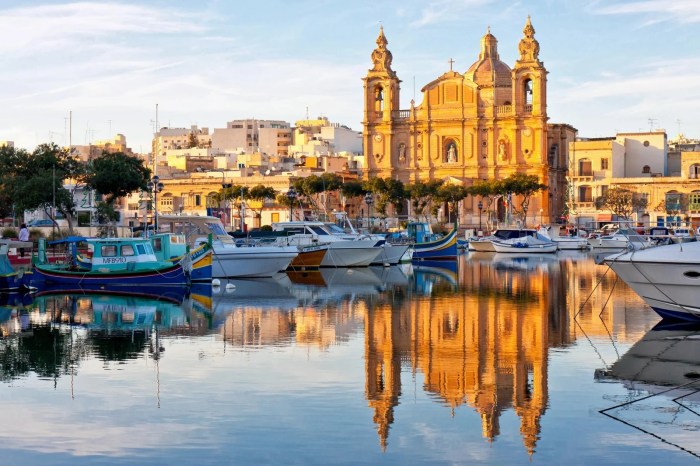
Malta’s compact size and well-developed infrastructure make it easy to navigate, even for budget-conscious retirees. Various transportation options cater to different needs and preferences, allowing retirees to explore the island at their own pace and within their budget. Understanding the cost-effectiveness of each method is crucial for maximizing your Maltese experience without breaking the bank.Getting around Malta effectively involves considering the interplay of public transport, car rentals, and potentially even taxis or ride-sharing services.
Each option offers distinct advantages and disadvantages, with varying degrees of affordability and convenience.
Public Transport Options
Public transport in Malta is a reliable and cost-effective way to get around. The bus network covers most areas, providing frequent services. Understanding the routes and schedules is key to efficient travel.
- Malta’s public transport system, primarily buses, is extensive and reaches most areas of the islands. This provides a budget-friendly way to navigate the island, with fares often less than €2 per trip.
- The system has various bus routes, each connecting different parts of the islands. Using a bus pass can be more economical for frequent travelers.
- Schedules are generally reliable, with buses running at regular intervals throughout the day and night. However, it is always advisable to check the schedules before you embark on a journey.
Car Rental Costs and Benefits
While owning a car in Malta isn’t necessarily budget-friendly, renting a car for a certain period can be an attractive option, especially for those who prefer flexibility. Fuel costs are a key factor to consider.
- Rental cars provide greater freedom and flexibility in exploring the island at your own pace. However, rental costs can vary depending on the season and the type of vehicle.
- Consider the costs of fuel and potential parking fees, as these can add up quickly, especially if you are planning longer journeys or daily commutes.
- For those who intend to explore the island at their own pace, renting a car might be an excellent option for longer trips, providing a sense of independence and freedom.
Taxi and Ride-Sharing Alternatives
Taxis and ride-sharing services offer convenience, particularly for short distances or when public transport isn’t readily available. They are more expensive than other options, but can be useful for occasional needs.
- Taxis and ride-sharing services are generally more expensive than other options, but can be a convenient alternative for short trips or when public transport isn’t accessible. Pre-arranged taxis might be a better option for cost-conscious travelers.
- Ride-sharing services may offer a more budget-friendly option for groups, but fares can fluctuate based on demand.
Comparative Cost Analysis, Malta budget friendly expat retiree destination
The table below provides a basic comparison of transportation options, highlighting the cost-effectiveness of each. It is crucial to remember that costs can vary depending on individual circumstances and usage patterns.
| Transportation Method | Typical Cost (per trip/day/month) | Pros | Cons |
|---|---|---|---|
| Public Bus | €1-€2 per trip | Affordable, extensive network, frequent services | Can be time-consuming, limited flexibility |
| Car Rental | €20-€50 per day (plus fuel) | Flexibility, freedom to explore at own pace | Higher cost, parking fees |
| Taxi/Ride-Sharing | €5-€15 per trip | Convenience, useful for short distances | More expensive than public transport |
Local Cuisine and Food Shopping
Malta’s culinary scene offers a delightful blend of Mediterranean flavors and a rich history, making it an appealing destination for budget-conscious retirees. The local cuisine, deeply rooted in the island’s history, provides a delicious and affordable way to experience Maltese culture. From fresh seafood to hearty pasta dishes, there’s something for everyone, and the prices are often more accessible than in tourist hotspots.Exploring Malta’s local markets and grocery stores is a fantastic way to discover affordable and authentic food.
The variety of ingredients available, especially fresh produce, meats, and cheeses, is impressive. Knowing where to shop and what to look for can save you money and enhance your culinary experience. Additionally, many traditional Maltese dishes are surprisingly inexpensive to prepare at home.
Affordable Dining Options
Malta boasts a range of affordable dining options, catering to various tastes and budgets. Local eateries and family-run restaurants often offer set menus or fixed-price meals, ensuring budget-friendly choices. These establishments often focus on traditional Maltese dishes, using fresh, local ingredients. Furthermore, street food vendors and kiosks provide quick and economical meals.
Grocery Shopping for Budget-Conscious Retirees
Shopping at local grocery stores is key to experiencing affordable Maltese cuisine. These stores offer a wide array of fresh produce, meats, and dairy products, often at competitive prices. Supermarkets like Lidl and Spar offer great value for money, particularly for staples like pasta, rice, and canned goods. Additionally, visiting local markets provides an authentic experience and can yield impressive savings.
These markets often feature fresh produce and local goods, sold directly from farmers and producers.
Affordable, Traditional Maltese Dishes
Traditional Maltese cuisine emphasizes simple, wholesome dishes using fresh, local ingredients. Some examples of affordable and flavorful dishes include:
- Pasta with tomato sauce (Pasta tal-Bżar): A classic Maltese dish featuring simple pasta, tomato sauce, and herbs, easily adaptable to various budgets.
- Ftira: This flatbread, often filled with various ingredients like tuna, tomatoes, and onions, is a popular and affordable quick meal.
- Stuffed vegetables (Fillijiet): A hearty and budget-friendly dish where vegetables are filled with a mixture of rice, herbs, and vegetables. They’re both nutritious and flavorful.
- Seafood dishes (Ikel tal-Baħar): Malta’s proximity to the sea means fresh seafood is readily available at affordable prices. Simple grilled fish or pasta dishes with seafood are common and cost-effective options.
Affordable Restaurants and Grocery Stores in Malta
The following table provides a list of some affordable restaurants and grocery stores in Malta, categorized for ease of reference.
| Category | Name | Description |
|---|---|---|
| Restaurants | La Taverna | Traditional Maltese cuisine, fixed-price menus. |
| Restaurants | Ristorante Pizzeria | Wide range of pizzas and pasta dishes, good value for money. |
| Restaurants | Cafe Bistro | Casual dining with affordable sandwiches, salads, and pasta dishes. |
| Grocery Stores | Lidl | Wide selection of groceries at competitive prices. |
| Grocery Stores | Spar | Extensive range of products, including fresh produce and local goods. |
| Grocery Stores | Local Markets | Variety of fresh produce, meats, and local goods. |
Community and Social Life for Expat Retirees
Malta offers a welcoming atmosphere for expat retirees seeking vibrant social connections. The island nation’s rich history, warm culture, and strategic location contribute to a thriving community for those seeking a new chapter in life. The Maltese people are generally friendly and approachable, making it easier to integrate into the local society.Finding your place in a new community is often about proactively seeking out opportunities.
Malta, with its diverse expat population, provides numerous avenues for retirees to connect with like-minded individuals and locals. This includes a wide range of social events, activities, and opportunities for building friendships and finding camaraderie.
Malta is a surprisingly budget-friendly expat retiree destination, offering a fantastic quality of life. While northern Australia is bracing itself for Cyclone Sandwich, as reported in this article ( northern australia braced for cyclone sandwich ), Malta’s sunny weather and lower cost of living make it an attractive alternative for those seeking a warm climate and a lower-maintenance lifestyle.
It’s a great place to consider for retirement.
Connecting with Other Retirees
Many expat retirees find solace and support in connecting with other individuals who share similar circumstances and experiences. This sense of community is particularly valuable for those seeking companionship and shared interests. Malta has several expat groups, clubs, and organizations that facilitate such connections. These groups often host events and gatherings that allow retirees to meet and interact.
Connecting with Locals
Beyond expat communities, building relationships with locals is essential for a complete integration into Maltese society. The Maltese are generally welcoming to foreigners and appreciate the opportunity to share their culture and traditions. Volunteering at local charities or community projects is an excellent way to connect with locals and contribute to the community. Joining language exchange groups or attending local cultural events can further strengthen these connections.
Social Events and Activities
Malta boasts a vibrant calendar of social events catering to retirees’ interests. These events may include themed dinners, trips to historical sites, cultural performances, or outings to nearby islands. Local clubs and organizations often host activities that cater to specific interests, from book clubs to hiking groups.
Finding and Participating in Local Groups
Discovering local groups and activities is straightforward. Visit local community centres and libraries to find details about ongoing events and meet other participants. Local newspapers, community bulletin boards, and online forums can also provide valuable information. Social media platforms like Facebook and Meetup.com can be instrumental in locating and joining relevant groups.
Community Activities for Retirees
| Activity Type | Description | Example |
|---|---|---|
| Cultural Events | Attend performances, concerts, exhibitions, or historical tours. | Malta Opera House performances, art exhibitions, or guided tours of ancient sites. |
| Social Clubs | Join groups based on hobbies, interests, or shared activities. | Book clubs, knitting circles, or walking groups. |
| Outings and Trips | Explore local attractions, nearby islands, or participate in day trips. | Trips to Gozo, Comino, or historical sites. |
| Language Exchange | Connect with locals to practice and improve language skills. | Informal conversations with locals, or classes focusing on Maltese language. |
| Volunteering | Contribute to the community through charitable activities. | Helping at local charities, animal shelters, or environmental projects. |
Visa Requirements and Residency Options
Retiring in Malta can be a dream come true, but understanding the visa process is crucial. This section details the various options available to expat retirees seeking permanent residency in Malta, outlining the requirements and application procedures. Navigating these steps can significantly impact your relocation experience.Malta offers several visa routes tailored for retirees, each with specific criteria and application procedures.
Malta’s a fantastic budget-friendly option for expat retirees, offering a warm climate and a wealth of history. Thinking about your retirement plans and how to best manage weather risks? weathepromise tech ai insurance weather traveling provides innovative solutions for travelers, helping you prepare for unexpected weather changes. Ultimately, Malta’s affordable lifestyle and pleasant weather make it an ideal choice for those seeking a relaxed retirement.
The key is to research and choose the visa best suited to your circumstances and financial situation.
Visa Categories for Expat Retirees
Various visa options cater to different needs. Different visa types offer varying levels of residency, from short-term stays to permanent residency.
- Long-Term Residence Visa: This visa category is often ideal for retirees who plan to stay in Malta for an extended period. Eligibility typically requires proof of sufficient financial resources to support yourself without relying on public funds. This may include bank statements demonstrating a certain amount in savings or investments.
- Permanent Residency: Achieving permanent residency usually involves meeting stringent criteria and demonstrating long-term ties with Malta. This typically includes a substantial period of time residing in Malta under a valid long-term visa.
- Golden Visa: This visa is linked to investments in Malta, such as purchasing property. While appealing, it often carries higher financial requirements compared to other options, making it less accessible to those with more modest means. It is crucial to understand the terms and conditions related to maintaining this visa. For example, some Golden Visa programs might require ongoing investments or specific property maintenance requirements to keep the visa active.
Application Process and Documentation
A well-organized application process is key. Gathering necessary documentation and completing the application accurately is critical for a smooth transition.
- Application Forms: Obtain the specific application forms from the official government website or authorized immigration offices. Ensure that you carefully complete all sections with accurate information.
- Supporting Documents: Prepare and submit all required documentation, including proof of financial stability, health insurance, criminal background checks, and proof of accommodation. Consider obtaining certified translations for any documents not written in Maltese or English.
- Fees: Be aware of and pay any associated application fees, which can vary depending on the visa category. Check the official website for up-to-date fee schedules.
Table of Visa Categories and Requirements
The following table provides a concise overview of the different visa categories for expat retirees in Malta, outlining some of the general requirements. Note that specific requirements and eligibility criteria may vary and are subject to change. Consult official government sources for the most current information.
| Visa Category | General Requirements | Suitability |
|---|---|---|
| Long-Term Residence Visa | Proof of sufficient funds, health insurance, and no criminal record. | Suitable for retirees planning a longer stay. |
| Permanent Residency | Extended period of lawful residence, financial stability, and integration into Maltese society. | Ideal for retirees seeking permanent settlement. |
| Golden Visa | Investment in Maltese property or other qualifying assets. | For retirees seeking a fast-track to residency with significant financial resources. |
Practical Tips for Budget-Conscious Retirees in Malta
Malta, with its beautiful landscapes and rich culture, offers a compelling retirement destination for budget-conscious individuals. However, savvy planning is key to maximizing your savings and enjoying a comfortable lifestyle. Understanding local costs and adopting money-saving strategies are crucial for a fulfilling retirement experience.Careful financial management is essential for a successful and enjoyable retirement in Malta. This involves a proactive approach to budgeting, cost-cutting, and wise investment strategies.
By implementing practical tips, retirees can maintain a high standard of living while staying within their financial means.
Maximizing Savings
Careful planning is vital to ensure your retirement savings last throughout your years in Malta. A crucial aspect of this planning is understanding the local cost of living and adjusting your spending habits accordingly. Early planning allows you to adjust your lifestyle and financial expectations, leading to a smoother transition into retirement.
- Regular Financial Reviews: Regularly assess your income and expenses to identify areas where you can cut back. Consider using budgeting apps or spreadsheets to track your spending. This allows you to identify and address any potential financial pitfalls early on.
- Diversify Your Income Streams: Explore part-time work or freelance opportunities if your current income isn’t sufficient to cover your desired lifestyle. This could include offering services like tutoring or online work.
- Prioritize Needs Over Wants: Differentiate between essential needs and non-essential wants. This allows you to focus on the essential aspects of your life, thereby reducing unnecessary expenses.
Minimizing Expenses
Finding ways to reduce your expenses is crucial for extending your retirement savings. It involves smart choices in housing, transportation, and daily spending habits.
- Housing Options: Consider renting a smaller apartment or house rather than a large property. Look for off-season deals and negotiate rental rates. Shared accommodations can significantly reduce living costs.
- Transportation Alternatives: Public transport, walking, or cycling are often more economical than owning a car. Research the local public transportation system and consider its accessibility for your needs.
- Meal Planning and Grocery Shopping: Plan your meals in advance to avoid impulse purchases. Shop at local markets and supermarkets for budget-friendly options. Prepare some of your meals at home to reduce dining-out costs.
Managing Finances and Budgeting
Effective financial management is essential to maintain a comfortable lifestyle while minimizing expenses.
- Create a Detailed Budget: Track all income and expenses meticulously. This will help you identify areas where you can save money and ensure you’re staying within your budget.
- Emergency Fund: Establish a dedicated emergency fund to cover unexpected expenses. Having a cushion against unforeseen circumstances can provide peace of mind.
- Seek Professional Advice: Consider consulting with a financial advisor specializing in retirement planning for personalized guidance on investment strategies and budgeting.
Avoiding Common Pitfalls
Understanding potential financial challenges can help retirees avoid costly mistakes.
- Ignoring Hidden Costs: Be mindful of additional costs such as utility bills, internet access, and insurance premiums. Factor these costs into your budget.
- Overspending on Leisure Activities: While leisure is important, ensure that your spending on activities aligns with your budget. Look for affordable entertainment options.
- Underestimating Healthcare Costs: Healthcare expenses can be substantial. Factor in potential medical costs when budgeting for your retirement years.
Money-Saving Strategies
Implementing practical strategies can help retirees stretch their budgets.
- Utilize Coupons and Discounts: Look for discounts and coupons, particularly at local markets and shops. Loyalty programs can also help save money over time.
- Negotiate Prices: Don’t hesitate to negotiate prices for services or products. This can result in significant savings, particularly for larger purchases.
- Comparison Shopping: Compare prices across different vendors or service providers before making a purchase to ensure you’re getting the best value.
“Careful planning, budgeting, and a proactive approach to cost-cutting are key to a comfortable retirement in Malta. Staying informed about local costs and seeking professional financial advice are essential for successful money management.”
Closing Notes
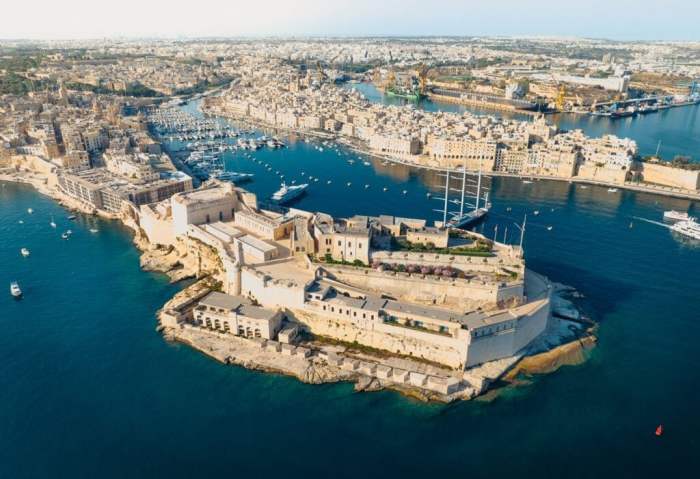
In conclusion, Malta presents a compelling opportunity for budget-conscious expat retirees seeking a fulfilling retirement. From affordable housing options to a rich tapestry of activities, Malta provides a unique and attractive blend of lifestyle and affordability. This guide has explored the key aspects of retirement in Malta, highlighting the practical considerations for those looking to make the move.
The cost-effectiveness, coupled with the vibrant culture and lifestyle, makes Malta a promising destination for a fulfilling retirement.
